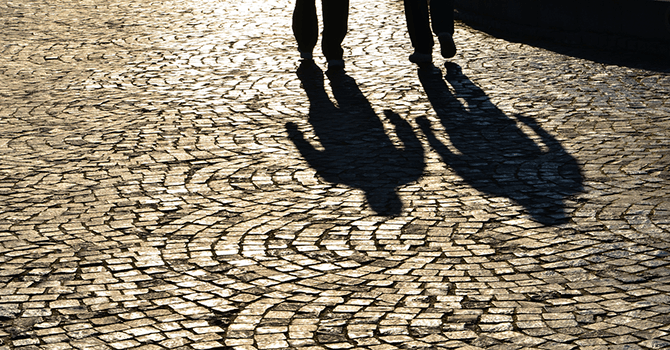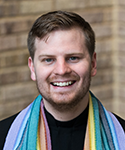Several months ago, looking out over the expanse of divisions within my family, I wondered how my father and I might uncover common ground.
My dad, a conservative, fundamentalist Baptist pastor still living in my rural hometown, accepted my invitation to a weekly Bible study. This is no small thing, considering I am a queer, politically and theologically progressive minister in Chapel Hill, North Carolina.
We began our exchange hoping that we might discover shared civic values through this mutual source of inspiration, and that through the Scripture we might find our way back to one another.
As our nation continues to endure the aftershocks of a contentious presidential race, some of our leaders hope to draw our civic attention to an even greater challenge: healing our country’s divides.
In his first address to the American public as president-elect, Joe Biden tellingly interpreted the mandate of this election not through a policy agenda but rather through the wisdom of Ecclesiastes: “The Bible tells us that to everything there is a season -- a time to build, a time to reap, a time to sow. And a time to heal. This is the time to heal in America.”
Yet the divisions the president-elect called us to bridge are deeper than ever, and we boast few civic resources to address these fractures. As Ezra Klein notes in his book “Why We’re Polarized,” the identities by which we sort ourselves are increasingly stacked, multiplying their magnetic “pull-push” force. They both reinforce one another and insulate us from those with whom we disagree.
My family story is not some feel-good tale. There are profound and enduring differences between my father and me, and at times this Bible study has led to arguments so heated that we’ve had to end our conversation abruptly, pray together and then take a week off.
It is also important to note that the particular circumstances of our relationship are not applicable to every context. For all the differences that divide us, my father and I have many shared identities -- like our whiteness. What is counted as good for white people is hardly the good common to us all.
But I knew going in that my father had the capacity to hold space for disagreement and to remain attentive to pain he did not understand, as he did when I came out several years ago. My father had “earned the right to hear my story,” as author Brené Brown would encourage.
In many respects, my father and I mirror our national divisions, which are often considered so deep as to constitute an irreparable ethical fracture. Over the last four years, I have seen and shared many social media posts that reframe differences of political opinion as differences in morality itself. The stakes could not be higher, and in the face of such division, civic virtues like the common good seem passé, even morally anemic.
I have found, however, that the Bible has an incredible capacity to hold this encounter across difference. Even when my father and I disagree on the particular application of Scripture, the connection we build around it becomes a sacred meeting place. With a common commitment to a shared text and a reverence for our responsibility for one another, my father and I have uncovered the messy, hopeful civic possibility of the biblical witness.
Political philosopher Danielle Allen insists that for the healing of our democracy, we must have a shared civic story, one that holds both the “gory” and the “glory” of our nation’s past. Only with this reckoning might we uncover shared values that could define our future together.
My father and I have found that Scripture models the complexity necessary to hold the human story. We often lean on its wisdom as we reckon with the perils and promise of our nation’s history.
My dad recently joined several other pastors in his area for a study of race in America. Building on that conversation together, he and I have traced some of the enduring legacies of white supremacy today.
We do not always agree on where and how this country’s “original sin” shows up in contemporary American life, but we can always consult Christ’s prophetic vision of a more just world in our efforts to address it.
My father and I have also wrestled with and rested in the tension inherent in Scripture’s call to transform the world. For even as Christians are called to reckon with the urgency of the injustices that define our time, we must also hold fast to an eternal time scale that is beyond our reach.
We are part of a revolution that Christ began 2,000 years ago and that will continue long after us. As the Rev. Jennifer Bailey says, our faith tradition’s “time currency is eternity … not election cycles.” The biblical witness offers both this long view of history and the moral imperative to pursue justice in our time.
But most importantly, perhaps, my father and I have each placed the gospel at the center of our civic commitments. The biblical witness is clear that what is counted good news among “the least of these” is the good common to us all. Tending to their well-being is our animating social concern as Christians.
Though my father and I do not always agree on how this gospel vision shows up in our nation’s politics or policy, we keep challenging one another to ask what Christ’s proclamation of good news means for us today.
The messy, hopeful practice of returning to and carrying this question together is a small but substantial step toward one another. And, I hope, toward a shared vision of a just society.
As I reflect on the weeks my father and I have spent together in prayerful conversation, I believe that we can reclaim the common good as a robust civic virtue. I know that this vocation of bridge building is not for everyone and that these encounters across difference require a deep attentiveness to the privilege and power we carry into them.
But for those who feel so called, returning to the biblical witness in search of the common good might be a first faithful step toward the national healing we seek.



















